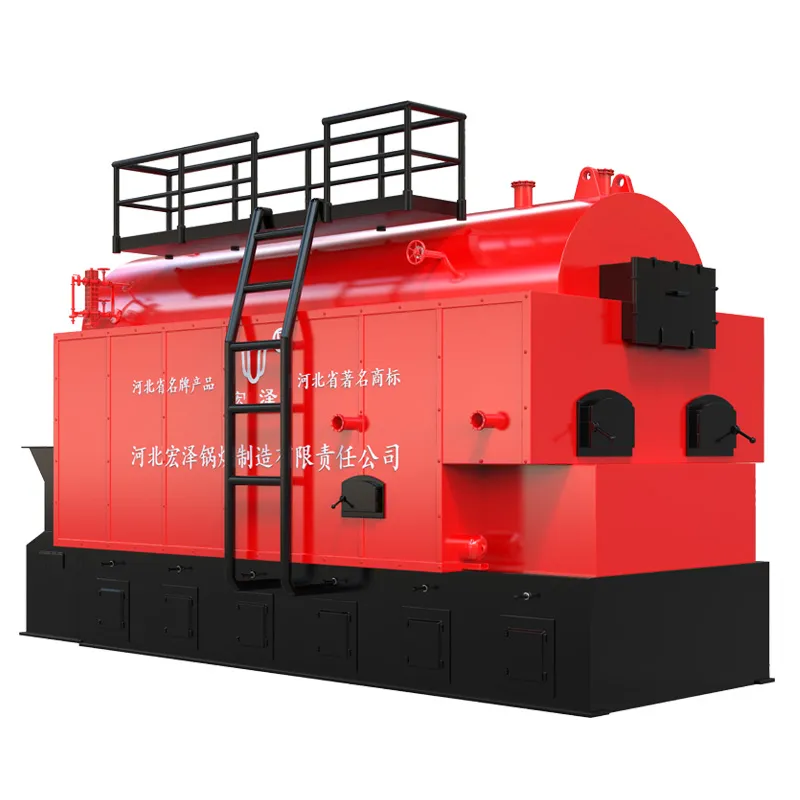
दिसम्बर . 29, 2024 16:02 Back to list
Understanding Thermal Fluid Systems in Industrial Boiler Applications and Efficiency
Understanding Thermal Fluid Boilers An Overview
Thermal fluid boilers, often referred to as thermal oil heaters, are specialized systems designed to efficiently transfer heat through the use of a thermal fluid, typically an oil or synthetic fluid. These boilers are increasingly popular in various industrial applications due to their high efficiency, versatility, and ability to provide precise heat control.
How Thermal Fluid Boilers Work
The fundamental operation of a thermal fluid boiler revolves around the circulation of a thermal fluid through a closed loop. The unit heats the fluid to a desired temperature, often reaching between 300°C to 400°C (572°F to 752°F), which is much higher than the boiling point of water. The heated thermal fluid then circulates through heat exchangers where it transfers its heat to the process requirements, be it for heating, cooking, drying, or other applications.
The system typically consists of a burner, a heat exchanger (fired or indirect), an expansion tank, and a circulating pump. The burner generates heat through the combustion of fuels such as natural gas, diesel, or biomass. The heat produced warms the thermal fluid in the boiler, while the circulating pump ensures continuous movement of the heated fluid to various parts of the industrial process.
Advantages of Thermal Fluid Boilers
1. High Efficiency Thermal fluid boilers offer greater thermal efficiencies compared to traditional steam boilers. The ability to operate at higher temperatures without the corresponding pressure risks allows industries to optimize their thermal processes.
2. Lower Operating Pressure Unlike steam systems, which require high pressure to achieve high temperatures, thermal fluid systems operate at lower pressures. This significantly reduces the risk of pressure-related hazards, making them safer to operate.
3. Precise Temperature Control Thermal fluid heaters can maintain a consistent and uniform temperature, which is crucial for processes that require precise thermal management, such as chemical processing, food production, and plastics manufacturing.
4. Versatile Applications These boilers can be used in a wide variety of applications, including curing processes, heat tracing, and thermal storage. Their versatility makes them suitable for numerous industries, from manufacturing to energy production.
thermal fluid boiler

5. Long Operational Life The materials used in constructing thermal fluid boilers are designed to withstand high temperatures and thermal cycling, contributing to a longer operational life span compared to traditional boilers.
Considerations for Implementation
When considering the implementation of a thermal fluid boiler, it is essential to take into account several factors
1. Choice of Thermal Fluid Selecting the right thermal fluid is critical. Different fluids have varying thermal properties, temperature limits, and compatibility with materials of construction.
2. Installation Space Thermal fluid boilers can be compact, but proper space allocation for circulation pumps, expansion tanks, and heat exchangers must be planned.
3. Maintenance Needs Regular maintenance is essential for ensuring efficient operation and longevity of the system. Operators should be trained to monitor fluid condition, perform regular checks, and replace fluid as necessary.
4. Environmental Considerations The emissions from the combustion process need to be carefully managed. Selecting an efficient burner, implementing proper emissions control technologies, and being compliant with environmental regulations are paramount for sustainable operation.
Future Trends
The future of thermal fluid boilers looks promising, particularly with the rise in energy efficiency mandates and environmental sustainability goals. Innovations in thermal fluid technology, such as the development of bio-based thermal fluids and advanced monitoring systems, are emerging trends that could further enhance the performance and eco-friendliness of these systems.
In conclusion, thermal fluid boilers are an efficient, versatile, and safe option for various industrial heating processes. Their ability to provide high temperatures at lower pressures makes them an attractive choice across numerous sectors. As industries continue to seek efficient solutions, the role of thermal fluid boilers is poised to grow, catering to the evolving needs for energy efficiency and environmental sustainability.
-
Oil Fired Hot Water Boilers Sale - High Efficiency & Affordable
NewsJul.31,2025
-
High-Efficiency Commercial Oil Fired Steam Boiler for Industry
NewsJul.30,2025
-
High-Efficiency Biomass Fired Thermal Oil Boiler Solutions
NewsJul.30,2025
-
High Efficiency Gas Fired Thermal Oil Boiler for Industrial Heating
NewsJul.29,2025
-
High-Efficiency Gas Fired Hot Water Boiler for Sale – Reliable & Affordable
NewsJul.29,2025
-
High Efficiency Biomass Fired Hot Water Boiler for Industrial and Commercial Use
NewsJul.29,2025
Related PRODUCTS






















